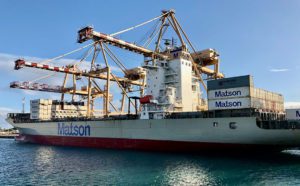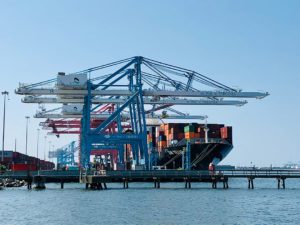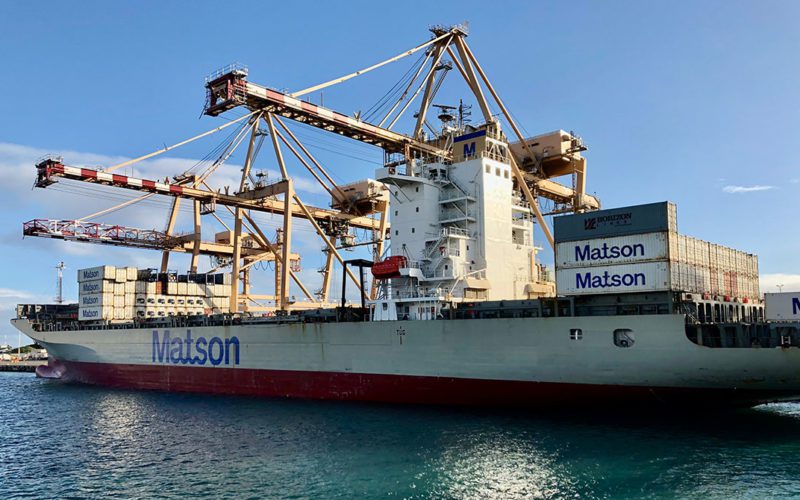
A maritime group based in Massachusetts has announced plans to create a new open ship registry based in the U.S. Virgin Islands (USVI).
The plan was developed by Northeast Maritime Institute (NMI), a college and training center based in Fairhaven, Mass., and its related think tank, the Center for Ocean Policy and Economics (COPE). It would establish the first and only international U.S. open ship registry, making it possible for foreign vessels to register there.
In a white paper announcing the proposal, COPE said the effort will strengthen America’s position in the maritime world, help address global shipping bottlenecks, and improve conditions for seafarers, among other benefits.

“The creation of an open international U.S. Virgin Islands registry will expand the number of U.S.-flagged vessels traversing the world’s oceans,” according to the white paper released by NMI and COPE. “Those ships that fly the USVI flag will carry the same level of protection as their U.S.-flagged counterparts as they travel around the world.”
Labor organizations representing thousands of American mariners condemned the plan. They suggest the effort is intended to undercut American mariners and save shipowners money.
“How they intend to pull this off is unstated,” said Don Marcus, president of the International Organization of Masters, Mates & Pilots (MM&P).
He described the plan as a “case of labor arbitrage” that would allow ship operators to save money by employing foreign mariners while reaping the regulatory benefits of a U.S. flag.
“Their reference to increasing job opportunities for Americans is a farce,” Marcus said. “And to us, it is an entrepreneur trying to work a scam.”
Eric Dawicki, president of NMI, declined to comment on the registry proposal. Dawicki is also president of the Commonwealth of Dominica International Maritime Registry.
In an email, Dawicki said it was “ethically challenging” to speak to Professional Mariner because the magazine’s parent company, Training Resources Maritime Institute in San Diego, is a competitor in the field of maritime training.
For generations, oceangoing ships were registered in the home country of their owners. That practice began to change in the second half of the 20th century as so-called flags of convenience emerged in earnest. These allow shipowners to register in countries where they have virtually no connection or presence. Such countries typically offer tax or regulatory advantages that reduce operating costs, according to the United Nations.
Modern flags of convenience include Panama, the Marshall Islands, and Liberia. Concerns about flags of convenience have been addressed at length by seafarers’ groups, unions and non-governmental organizations. The International Transport Workers’ Federation said mariners on ships flying flags of convenience can face very low wages, poor onboard conditions, inadequate food and clean drinking water, and long periods without proper rest.
The United States shipping fleet, of course, is subject to the Jones Act and a rigorous regulatory regime that offers better protection for mariners. In its white paper, COPE said the proposed USVI registry would be exempt from the Jones Act but would “meet or exceed” existing maritime standards established by the International Maritime Organization.
Even so, the proposal envisions extensive involvement from the U.S. Coast Guard. “As the U.S. flag state administrator, the U.S. Coast Guard (USCG) is well-suited to take a leadership role in the oversight and compliance strategy of this new USVI registry,” the white paper said.
“The USVI registration would be professionally managed as an independent entity … being completely open to all USCG officials, inspectors, and law enforcement personnel,” the COPE paper continued, adding that the registry “will enjoy complete synchronization with the USCG.”
The Coast Guard is responsible for registering vessels on behalf of the United States through the National Vessel Documentation Center, as well as assessing the safety of those vessels, and maintains the policy, procedures, and guidance to that end, spokesman Kurt Fredrickson said. “We have no comment on proposed alternatives which may change the process of vessel registration,” he continued.
In the open letter, the leaders of eight prominent U.S. maritime unions pushed back on assertions that the plan would help resolve supply-chain challenges. “Increasing America’s dependence on foreign-owned and foreign-manned vessels will exacerbate the current situation and will not somehow magically enhance America’s maritime posture,” the unions wrote.
They further asked the Biden administration, the U.S. Maritime Administration (MarAd), Congress and the Department of Defense to reject the assertion that “United States Virgin Islands-flag vessels be treated as if they are U.S.-flag and U.S.-crewed vessels for any purpose or for any program.”
MarAd said it is aware of the proposal for a USVI open registry, and it made clear the agency is not involved in the project.
“It remains the opinion of MarAd that the high standard maintained by the American women and men who operate U.S.-flag waterborne transportation ensures safe, reliable, efficient passenger and goods movement and supports the economic and national security of the United States,” the agency said. “As the DOT agency responsible for promoting the U.S.-flag, MarAd fully supports the U.S. flag vessels that provide essential services to our nation.”

